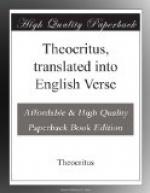Thrice spat she
on her robe, and, muttering low,
Scanned me, with half-shut
eyes, from top to toe:
Brought all her woman’s
witcheries into play,
Still smiling in a set sarcastic
way,
Till my blood boiled, my visage
crimson grew
With indignation, as a rose
with dew:
And so she left me, inly to
repine
That such as she could flout
such charms as mine.
O shepherds, tell
me true! Am I not fair?
Am I transformed? For
lately I did wear
Grace as a garment; and my
cheeks, o’er them
Ran the rich growth like ivy
round the stem.
Like fern my tresses o’er
my temples streamed;
O’er my dark eyebrows,
white my forehead gleamed:
My eyes were of Athene’s
radiant blue,
My mouth was milk, its accents
honeydew.
Then I could sing—my
tones were soft indeed!—
To pipe or flute or flageolet
or reed:
And me did every maid that
roams the fell
Kiss and call fair: not
so this city belle.
She scorns the herdsman; knows
not how divine
Bacchus ranged once the valleys
with his kine;
How Cypris, maddened for a
herdsman’s sake,
Deigned upon Phrygia’s
mountains to partake
His cares: and wooed,
and wept, Adonis in the brake.
What was Endymion, sweet Selene’s
love?
A herdsman’s lad.
Yet came she from above,
Down to green Latmos, by his
side to sleep.
And did not Rhea for a herdsman
weep?
Didst not thou, Zeus, become
a wandering bird,
To win the love of one who
drove a herd?
Selene, Cybele, Cypris, all
loved swains:
Eunice, loftier-bred, their
kiss disdains.
Henceforth, by hill or hall,
thy love disown,
Cypris, and sleep the livelong
night alone.
IDYLL XXI.
The Fishermen.
ASPHALION, A COMRADE.
Want quickens wit: Want’s
pupils needs must work,
O Diophantus: for the
child of toil
Is grudged his very sleep
by carking cares:
Or, if he taste the blessedness
of night,
Thought for the morrow soon
warns slumber off.
Two ancient fishers
once lay side by side
On piled-up sea-wrack in their
wattled hut,
Its leafy wall their curtain.
Near them lay
The weapons of their trade,
basket and rod,
Hooks, weed-encumbered nets,
and cords and oars,
And, propped on rollers, an
infirm old boat.
Their pillow was a scanty
mat, eked out
With caps and garments:
such the ways and means,
Such the whole treasury of
the fishermen.
They knew no luxuries:
owned nor door nor dog;
Their craft their all, their
mistress Poverty:
Their only neighbour Ocean,
who for aye
Bound their lorn hut came
floating lazily.
Ere the moon’s
chariot was in mid-career,
The fishers girt them for
their customed toil,
And banished slumber from
unwilling eyes,
And roused their dreamy intellects
with speech:—




